Measuring AI Search Accuracy When AI Assistants and Search Engines Don’t Agree
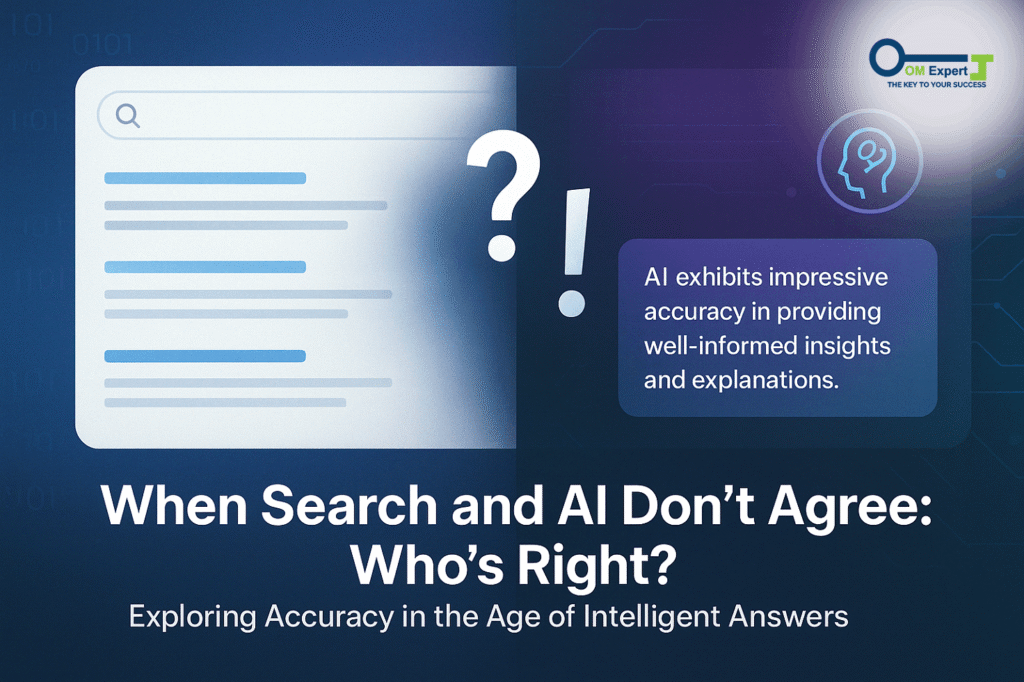
In today’s rapidly changing digital world, AI search accuracy has become one of the most important factors shaping how people find and trust information online. Traditional search engines like Google and Bing are now sharing the stage with AI assistants such as ChatGPT, Gemini and Claude. In addition to displaying a list of links, these systems also understand queries, condense concepts, and provide real-time, natural language responses.
However, this evolution has also introduced a growing conflict between AI assistants and search engines. The two frequently produce different answers, explanations and facts. Digital marketers, SEO specialists and regular users who depend on technology to make decisions must all be aware of these differences.
1. What Is AI Search Accuracy
AI search accuracy refers to how precisely an artificial intelligence system retrieves and presents relevant, factual and trustworthy information. Traditional search engines rely on live web crawling and rank results based on factors such as backlinks, keywords, and domain authority.
AI assistants, in contrast, use complex search engine algorithms and large language models to interpret intent rather than merely retrieve data. This difference leads to variations in how information is displayed, necessitating a standard way to estimate AI search accuracy across platforms.
2. Why AI Assistants and Search Engines Don’t Agree
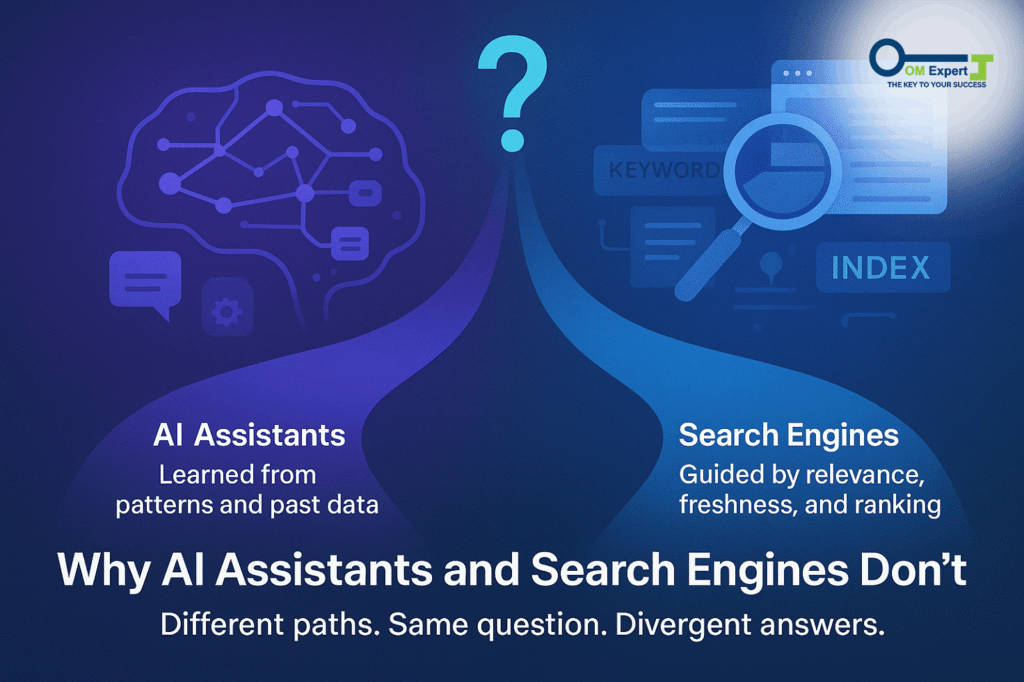
It becomes clear that they address information differently when comparing AI assistants vs search engines. AI assistants rely on learned data patterns, while search engines rely on indexed web content. AI models might misinterpret queries or reference outdated sources, leading to AI assistant errors.
Search engines, on the other hand, focus on freshness and relevance, guided by search engine ranking and keyword intent. This contrast highlights why disagreements occur and why tracking AI search accuracy is becoming increasingly important.
3. Key Metrics for Measuring AI Search Accuracy
- Relevance: How closely the AI response corresponds with the user’s intention
- Factual accuracy: Whether information matches verifiable data
- Completeness: Coverage of all key aspects of a query
- Consistency: Whether similar questions yield consistent answers
- Transparency: Availability of cited or traceable sources
These metrics help determine whether an AI-driven result can match or surpass the reliability of a traditional AI search engine optimization approach.
4. The Role of AI Assistants in Modern Search
AI assistants are reviewing how users access content. They provide instant, conversational answers without requiring users to explore links. Yet this convenience comes with challenges in AI assistant performance. Mistakes, outdated data or misunderstood queries can compromise AI search reliability and user trust.
Traditional search results allow users to cross-check multiple viewpoints, but AI-generated responses present a single explanation. In addition, marketers must ensure their websites are optimized for both search engines and how AI search tools present and simplify content.
5. Comparing AI Search Engines vs Traditional Search
The comparison between AI search engines and traditional search platforms is a modification of digital discovery.
Aspect | AI Search Engines | Traditional Search Engines |
Response Type | Conversational and summary-based | List of ranked links |
Transparency | Limited citation visibility | Source-based verification |
Personalization | Highly adaptive | Rule-based |
Speed | Instant summaries | Requires manual browsing |
Accuracy | Contextual but data-limited | Broad but keyword-focused |
This evolving landscape challenges both marketers and developers to rethink AI search capabilities and enhance the balance between creativity, accuracy and trust.
6. AI Search Accuracy and SEO Strategies
Businesses must adapt their SEO strategies to align with AI-driven discovery as AI search trends continue to shape digital ecosystems. Search visibility now depends on both search engine optimization and how AI interprets content meaning.
The emerging field of SEO vs AEO (Search Engine Optimization vs AI Engine Optimization) focuses on preparing content that AI models can understand, summarize and recommend. To achieve this, marketers use structured data, conversational content and AI content optimization techniques that strengthen AI search accuracy across different assistants and engines.
7. AI Search Accuracy in Marketing Insights
- Analyze AI-generated data to understand what users truly want.
- Use intent-based insights to design personalized campaigns.
- Apply AI-driven keyword trends to refine SEO and content strategy.
- Combine behavioral analysis with real-time search metrics for higher engagement.
8. The Growing Impact of AI in Search Engines
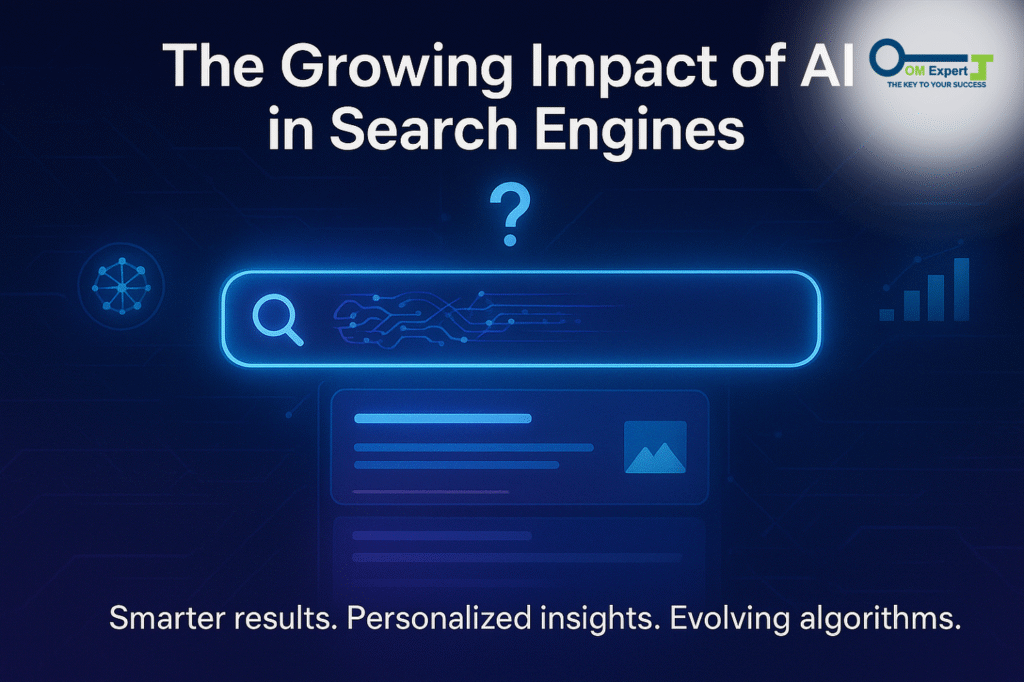
Modern AI in search engines enhances relevance and personalization. Google’s generative search features and Microsoft’s AI-integrated tools show how AI-powered search is transforming user experiences. These developments rely on deep AI search engine algorithms that analyze patterns rather than just keywords.
While this boosts efficiency, it also makes tracking AI search accuracy more complex, as algorithms evolve continuously through user feedback and machine learning adaptation.
9. Understanding AI Search Behavior
Understanding AI search behavior helps explain inconsistencies between different AI tools. Since language models learn from historical data, they sometimes replicate outdated or region-specific patterns. This behavior can affect AI search engine performance, leading to subtle differences in tone, data selection, and interpretation.
Watching these patterns helps businesses identify where adjustments in AI search engine tools or content structure are needed to improve AI search accuracy metrics.
10. Inside AI Search Engine Algorithms
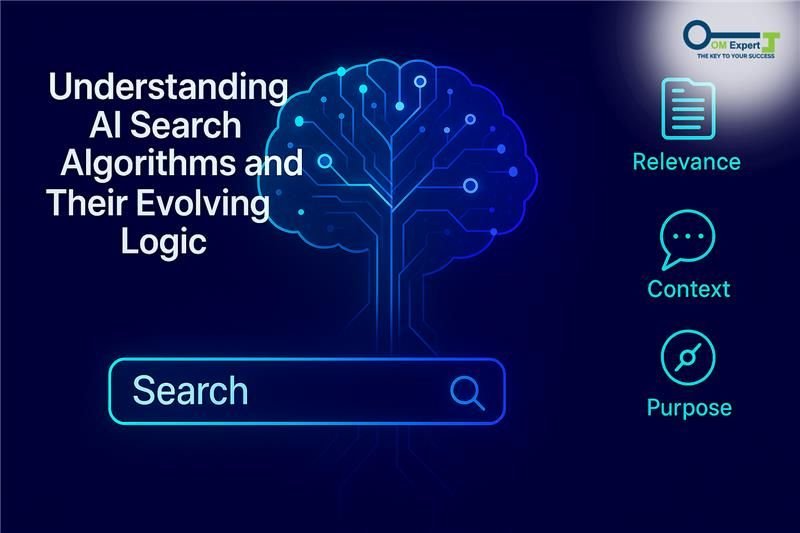
To stay ahead of evolving AI systems:
- Examine how AI determines topic relevance and purpose.
- Use natural language and structured data to optimize content.
- Keep up with algorithm changes that impact the accuracy of AI searches.
- Prioritize quality and authority to remain visible across AI search engines.
When businesses align with how AI evaluates credibility, they ensure consistent, accurate search results.
11. Monitoring and Measuring AI Search Accuracy
Businesses are now using advanced SEO tools and specialized AI search engine tools to track how accurately AI assistants represent their brand. This includes observing answer summaries, citation frequency, and data precision.
Marketers can identify accuracy gaps and improve their AI search engine optimization tactics by comparing AI-generated summaries with conventional search results. This proactive approach strengthens both credibility and audience trust.
12. Challenges in Maintaining Consistent AI Search Accuracy
Maintaining AI search accuracy requires addressing constant algorithmic shifts. AI systems may learn bias, misinterpret slang, or lack regional context. Transparency about data sources remains limited, making it difficult to verify validity.
These limitations can impact AI search engine rankings, forcing brands to focus more on applicability, freshness, and alignment with AI search engine capabilities to ensure ongoing visibility and trustworthiness.
13. Future of Search with AI Assistants and Algorithms
The future lies in seamless integration between AI and traditional search appliances. As AI search engines comparison studies reveal, both approaches have unique strengths. AI excels at understanding intent, while search engines influence indexing and verification.
Hybrid systems are combining worlds to improve AI search accuracy, providing users with answers that are not only fast but also contextually rich and verifiable.
14. Practical Steps to Enhance AI Search Accuracy
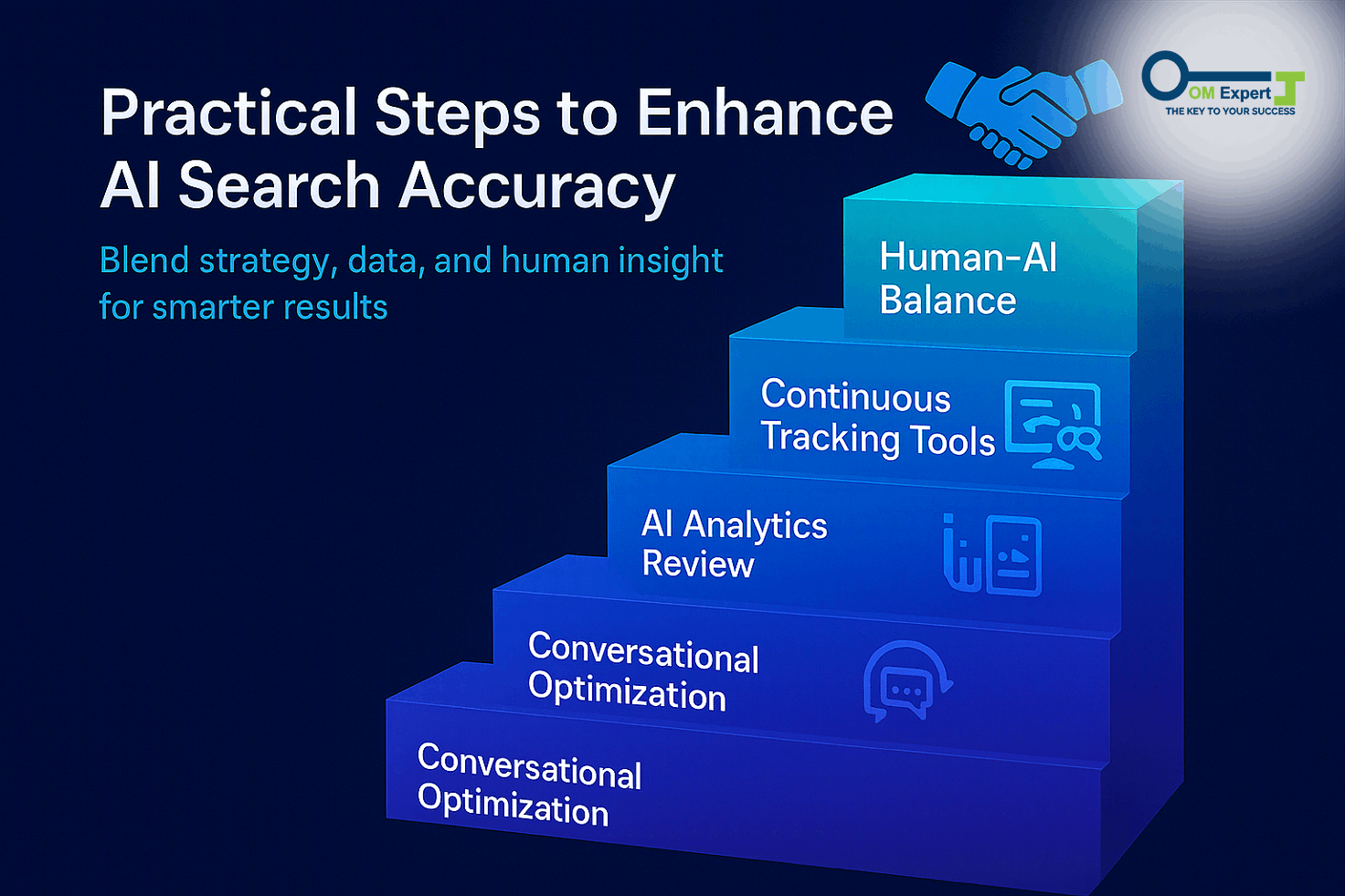
- Optimize for conversational tone to improve how AI search assistants interpret content.
- Regularly review and update content for relevance.
- Use analytics from AI search engine performance reports to fix instability.
- Employ AI search engine tools for continuous tracking and adjustments.
- Balance automation with human expertise for long-term reliability.
Each step ensures your brand remains credible in a landscape where information evolves faster than ever.
15. The Role of AI-Generated Content in Accuracy
AI-generated content has sped up content creation, but it has also raised concerns about accuracy. It can introduce bias or misinformation that misleads readers when poorly monitored. Balancing automation with human expertise ensures consistent quality and supports AI search accuracy across digital ecosystems.
Well-researched, credible, and human-reviewed content also boosts search engine results and ensures that AI systems have reliable material to reference when generating answers.
16. How AI Search Engine Tools Improve Optimization
Modern AI search engine tools such as SurferSEO, SEMrush, and Ahrefs are redefining how businesses manage AI search engine optimization. They help measure how AI systems perceive your website’s authority, structure, and clarity.
How these tools boost performance:
- Simulate how AI reads and ranks content.
- Track the AI search engine ranking to monitor brand visibility.
- Measure AI search engine performance to detect optimization gaps.
- Provide actionable insights to improve contextual relevance and trust.
Businesses can maintain top-tier AI search accuracy and adapt faster to algorithmic updates by using these tools regularly.
17. Improving AI Search Accuracy Through Content Quality
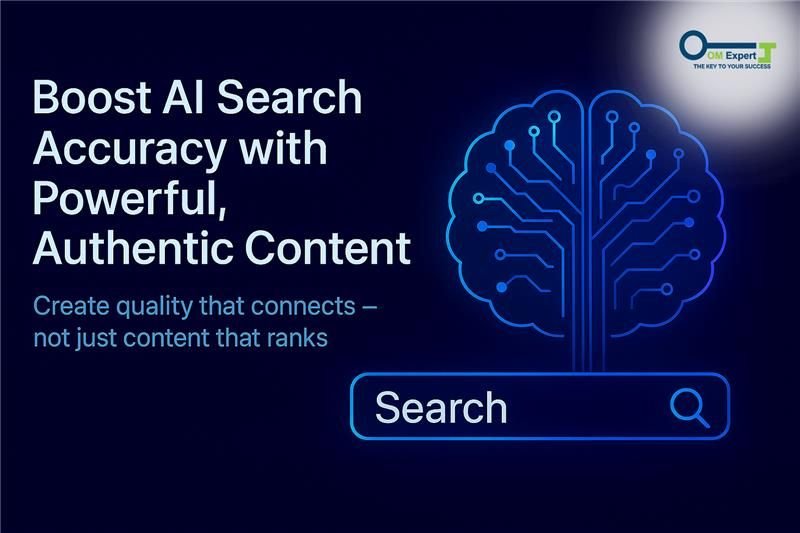
High-quality content remains essential for maintaining AI search accuracy. AI systems reward content that is factual, comprehensive, and user-focused. Making intelligent use of AI content generation ensures your digital assets deliver genuine value rather than meaningless information.
To establish authority and trust, marketers should use true storytelling, a reliable source, and effective AI search engine marketing. Accurate, authentic content improves AI-generated summaries and search engine traffic, boosting visibility across channels.
18. Enhancing Brand Authority
Analyzing AI search engine behavior helps brands understand how AI chooses what to display. AI favors sources that are credible, clear and consistent. Businesses can boost their authority by improving AI content generation and maintaining factual accuracy.
Steps to enhance brand trust:
- Monitor AI assistant performance to ensure accurate representation.
- Use verified data sources to maintain content integrity.
- Update outdated information to improve search engine results.
- Encourage consistent tone and voice across all digital assets.
Strong brand authority improves both human and AI recognition – reinforcing long-term AI search accuracy.
19. Building the Future of SEO and AI Integration
The future of digital growth lies in merging AI search engine capabilities with traditional SEO tools. This integration allows brands to stay relevant in an era where both AI assistants and search engines shape discovery.
How to prepare for the next phase:
- For more compelling stories, combine human creativity with AI search engine marketing.
- Make an effort to provide content that appeals to both human passion and AI logic.
- Track AI search accuracy across multiple platforms for consistency.
- Experiment with voice, visual and predictive search to expand reach.
By mastering this balance, businesses can secure leadership in the evolving world of intelligent search and AI-driven optimization.
Conclusion
In a world where digital answers shape decisions, maintaining AI search accuracy is key to trust and visibility. As technology advances, understanding the difference between AI assistants and search engines helps brands avoid confusion and misinformation. These days, creating high-quality material, refining strategies and assessing accuracy are crucial for success.
When your business is ready to grow smarter and faster in this AI-driven era, turn to OM Expert, your partner in intelligent digital growth and modern search success.
